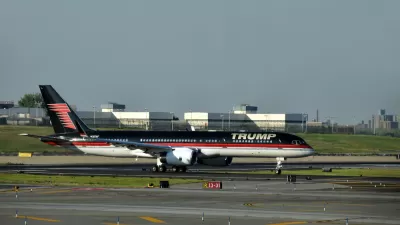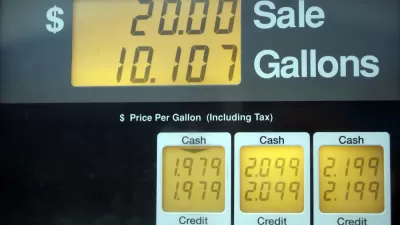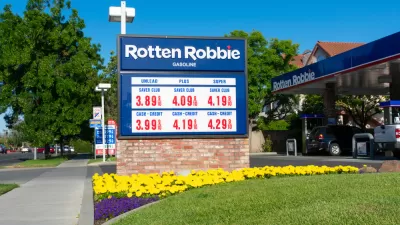A majority of Americans of both parties support raising the gas tax to pay for road improvements. Could it provide the source of the $200 billion in federal funds for Trump's $1 trillion infrastructure plan?
"Fifty-five percent of Americans in a Bloomberg National Poll say they would back an increase," report Mark Niquette and John McCormick for Bloomberg News. "The concept has bipartisan support, with majorities of Republicans (51 percent) and Democrats (67 percent) backing the idea."
One group not backing a tax increase are Trump's supporters, "with just 45 percent saying they’d support it."
The survey also shows there are geographical differences, with those who live in cities being more supportive of a higher gas levy (59 percent) than those in rural areas (48 percent). Those in the Northeast are more likely to back the idea (65 percent), while those in the South are the least likely (50 percent).
Unlike his predecessor, President Trump, has not ruled out hiking the 18.4-cents per gallon gas tax and 24.4 cents-per gallon diesel tax, last raised under President Bill Clinton by 4.3 cents per gallon in 1993, to fund road and bridge infrastructure, but he hasn't called for increasing the taxes either, though a key advisor has been more forthcoming.
According to the White House's Rebuild America's Infrastructure webpage, "the President has dedicated $200 billion in his budget for infrastructure that can be leveraged for a $1 trillion investment into our crumbling systems." However, details have yet to released, including where the $200 billion would come from within the budget.
"Billionaire real estate developer and long-time Trump ally Richard LeFrak – who heads a White House infrastructure advisory council alongside real estate investor and Vornado Realty Trust CEO Steven Roth... said he and his colleagues hope to put forward $200 billion in federal funds to be 'matched with another $800 billion, either from the states or from the private sector'," reported Andrew Sergel, economy reporter for U.S. News, last May. LeFrak supports raising the gas tax.
A gas tax uptick would be one way to drum up those federal dollars, LeFrak said.
"LeFrak said that even adjusting the gas tax for inflation 'would go a long way towards fixing the roads' and that voters wouldn’t punish politicians for raising the levy," add Niquette and McCormick, who go on to discuss reasons for increasing the tax due to declining revenues, and why politically it will be an uphill road.
Still, the poll shows there can be public support from both parties for raising the tax if it’s tied to fixing roads and bridges, said Mary Peters, a consultant and former U.S. transportation secretary under President George W. Bush.
It's worth noting that the first bailout of the Highway Trust Fund occurred under her watch. President Bush wanted to take the $8 billion from the Mass Transit Fund, but Congress insisted that it come from the General Fund. Highway subsidies grew steadily, totaling $65 billion, according to a June 2015 Congressional Budget Office report [pdf]. The five-year transportation reauthorization known as the FAST Act, signed in December 2015 by President Obama, added $70 billion to the bailout.
Peters said she probably would have concluded earlier this year that raising the gas tax was too big a lift politically. But especially after the collapse of efforts to repeal Obamacare this week, Trump and Congress will need a higher gas levy or other public funding to get support from Democrats to pass an infrastructure bill, she said.
States have shown more willingness to increase fuel taxes, presumably because they must balance their budgets, rather that put debt on the back of future generations, as the federal government has done with the Highway Trust Fund since 2008.
"Twenty-six states have raised or updated their gas taxes since 2013," write Niquette and McCormick. Earlier this month, Oregon was the eighth state to pass an increase to its gas tax in 2017.
Hat tip to AASHTO Daily Transportation Update.
FULL STORY: Americans Say They Back Higher Gas Tax to Fix Crumbling Roads

Maui's Vacation Rental Debate Turns Ugly
Verbal attacks, misinformation campaigns and fistfights plague a high-stakes debate to convert thousands of vacation rentals into long-term housing.

Planetizen Federal Action Tracker
A weekly monitor of how Trump’s orders and actions are impacting planners and planning in America.

San Francisco Suspends Traffic Calming Amidst Record Deaths
Citing “a challenging fiscal landscape,” the city will cease the program on the heels of 42 traffic deaths, including 24 pedestrians.

Defunct Pittsburgh Power Plant to Become Residential Tower
A decommissioned steam heat plant will be redeveloped into almost 100 affordable housing units.

Trump Prompts Restructuring of Transportation Research Board in “Unprecedented Overreach”
The TRB has eliminated more than half of its committees including those focused on climate, equity, and cities.

Amtrak Rolls Out New Orleans to Alabama “Mardi Gras” Train
The new service will operate morning and evening departures between Mobile and New Orleans.
Urban Design for Planners 1: Software Tools
This six-course series explores essential urban design concepts using open source software and equips planners with the tools they need to participate fully in the urban design process.
Planning for Universal Design
Learn the tools for implementing Universal Design in planning regulations.
Heyer Gruel & Associates PA
JM Goldson LLC
Custer County Colorado
City of Camden Redevelopment Agency
City of Astoria
Transportation Research & Education Center (TREC) at Portland State University
Jefferson Parish Government
Camden Redevelopment Agency
City of Claremont





























